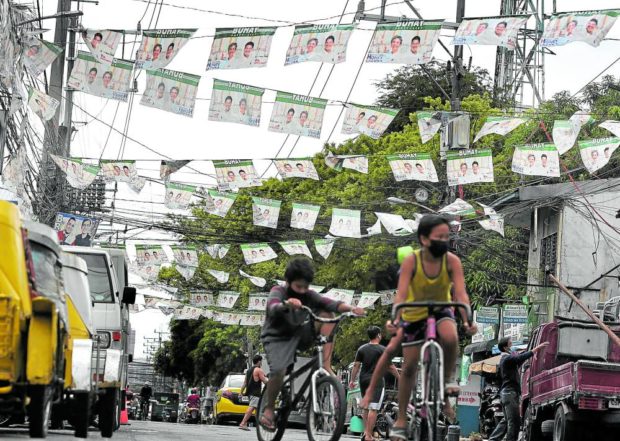
ADDED CHALLENGE | The Department of the Interior and Local Government remains reluctant to support calls to further ease pandemic restrictions in Metro Manila, citing the difficulty of enforcing minimum health protocols in public spaces, especially with the start of the official campaign season for candidates running in local elections. (Photo by MARIANNE BERMUDEZ / Philippine Daily Inquirer)
MANILA, Philippines — While Metro Manila is ready to shift to the most relaxed Alert Level 1, concerns remain about enforcement of public health protocols during the campaign season as well as the safety of public transportation for people returning to work when more business establishments reopen.
The Department of the Interior and Local Government (DILG) on Tuesday said it was reluctant to support calls to ease to Alert Level 1 due to risks of another COVID-19 surge from campaign activities in the run-up to the May elections.
The move should be studied thoroughly because “it is difficult to implement health protocols during the campaign period,” DILG Undersecretary and spokesperson Jonathan Malaya said on Tuesday.
The Philippine National Police has admitted that it was a challenge to ensure compliance with minimum health protocols, especially maintaining physical distancing in big crowds drawn by sorties of national candidates. Campaign activities of national candidates, including those running for president, vice president, senators, and representatives of party-list groups, started on Feb. 8.
According to Malaya, once the campaign period for local elective posts starts on March 25, “it will be much more difficult for the department, the PNP and the [Commission on Elections] to enforce the minimum public health standards.”
“We should seriously consider whether or not we are ready for alert level 1,” Malaya said.
But during the DILG’s consultations with the local government units in the country, Malaya said local chief executives expressed their readiness to ease the alert level.
Most areas in the country, including Metro Manila, are under Alert Level 2 until Feb. 28. Davao de Oro, Davao Occidental, Guimaras, Iloilo City, Iloilo province, South Cotabato and Zamboanga City remain under a more restrictive Alert Level 3.
Below WHO benchmark
Under Alert Level 1, all establishments — except for those under granular lockdowns — are allowed to operate at full capacity. Workers can also report on-site, and activities can be conducted at full-seating capacities even for indoor venues, provided minimum health standards are followed.
Mounting calls to relax the alert level have been fueled by improving pandemic numbers.
The COVID-19 positivity rate in Metro Manila is now less than the World Health Organization’s (WHO) recommended level of 5 percent, according to independent pandemic monitor OCTA Research. The WHO benchmark rate, sustained for two weeks, indicates that virus transmission is under control.
“The positivity rate in the NCR [National Capital Region, or Metro Manila] decreased to 4.9 percent… for the first time since Dec. 26, 2021, or prior to the Omicron wave of the pandemic,” said OCTA Research fellow Guido David.
The positivity rate of Metro Manila last week, according to OCTA, was 6 percent.
This refers to the percentage of tests conducted that came out positive for COVID-19.
The Department of Health (DOH) also reported 1,019 new infections on Tuesday, lower than Monday’s 1,427.
David said Metro Manila remained under “low-risk” classification as of Feb. 21, based on indicators calculated by US-based organization COVID Act Now.
He noted that Metro Manila’s average daily attack rate (Adar) decreased to 2.85 from 3.19 on Feb. 19. Adar is the average number of new cases in a given period for every 100,000 individuals.
“The reproduction number was stable at 0.21, which is very low, and the health-care utilization rate remained at 25 percent, which is also very low,” David added.
The reproduction number refers to the number of people that a person sick with COVID-19 can infect. A number less than 1 indicates that transmission is slowing down.
The national caseload, according to DOH data, was now 3,654,284.
Ready for Alert Level 1
The DOH said there were 56,668 active cases, of which 51,395 were mild.
The 2,988 recoveries brought the total number of survivors to 3,541,840, while the 13 fatalities raised the death toll to 55,776, the DOH said.
Speaking in Tuesday’s Laging Handa public briefing, the president of the Employers Confederation of the Philippines, Sergio Ortiz-Luis, said businesses were ready for Alert Level 1 as workplaces had already adopted health protocols against COVID-19.
The further reopening of the economy was a “big thing” for businesses because it would increase the spending capacity of hundreds of thousands of people who would return to their jobs or find new employment.
He criticized those saying that the country was not ready for further reopening, adding that this was not the sentiment of many people who have no jobs and were not eligible for government financial assistance.
Ortiz-Luis also called on the Department of Transportation to ensure the safety of the public transport system so that commuting would not lead to the spread of COVID-19, noting that the virus was being spread more in the going in and out of the workplace than in the workplace itself.
He added that small companies could not afford to provide shuttle services to their employees who had to take mass transportation to get to and from work.
RELATED STORIES
DOH says early campaign rally crowds ‘worrisome’
Cautious optimism aired as lower COVID alert level looms
Biz groups want to open up economy, shift to alert level 1

